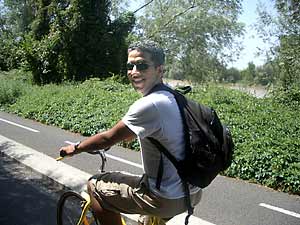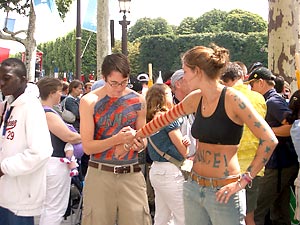With this installment, Puneet Kakkar concludes his dispatches from Paris.
Today was the last day of my internship at the Embassy. It was one of the
only times I have ever felt sad to stop working! As my time here in Europe
comes to an end, I've been reflecting more and more on my past — what I've
done, what I've seen, who I've met, and who I am.
This summer has significantly exposed me to the work world and to just what
the ideal internship is supposed to do. For instance, my work hours every day
have
been set in stone: 9 a.m. to 6 p.m., one hour for lunch. Amid my reports to
the boss, weekly meetings, note-taking sessions, et cetera it has been interesting
to see the difference between college and the professional world. For instance,
when writing reports for the State Department, there are times when I can't
go on at length to prove my theories or explain "why"; I have to be brief and
explain "what." My supervisors have often reminded me that "this isn't an academic
paper ... you have to be more succinct!" Lesson one: write powerfully. Sometimes
I believe that good writing is the best tool you can bring to the workplace — expression
(both written and oral) is the only means by which you can demonstrate your
knowledge.
'In the bigger picture, you can't go far without the
know-how, but it actually takes true brain power to take the facts to a higher,
more effective level. That takes practice.'
|
This job has also taught me that events rarely go as expected, especially in the international scene. Theory has it that Country X should maintain a certain policy toward Country Y; but in reality, because of culture, history, economics, and just plain politics, it doesn't happen. It makes me think about what I've learned as a Political Economies of Industrial Societies (PEIS) major and the extent to which I've applied that knowledge. I never regret studying what I study at Berkeley, but I have realized that it's the actual practice of WHAT I learn that makes the studying count. Knowing names, numbers, and philosophies will only take me so far; it's whether or not I know how to connect them to larger issues.
Just recently I studied the laws governing the wearing of the Muslim head
scarf, a topic on which I could have written a great 12 pages. However, the
true task
was to find the context in which such an issue was relevant to analyze. After
watching TV news broadcasts and reading the newspaper for weeks, I discovered
that France is changing its asylum and immigration laws to harmonize with those
projected by the European Union. Studying those two processes — less theoretical
or historical than the head scarf debate — gave
me a framework on which I could actually see how domestic affairs operate,
as well as how they in turn affect France's foreign policies with other countries
in the European Union.
Nevertheless, after 10 weeks, I feel that my knowledge base has expanded exponentially.
I came to the embassy with a working knowledge of France, and now I feel that
I've learned a lot more than I expected. Not only have I been exposed to the
internal dynamics of the country, but also to how France relates to the world
scene, and how events such as the war in Iraq create a response on the domestic
front. I've developed my writing skills, and my French has become a lot more "smooth" — my
interactions with French colleagues, other students, and the general public
have influenced my speaking speed, slang, and understanding. I will never forget
the surprised reaction I got when a French political analyst at the National
Assembly learned I was American: he said. "I expected you to be from a Francophone
country!" Nice to hear.
While my internship is over, I'm not quite finished. Working for the U.S. government in a subject about which I am so passionate has only fueled my interest to learn more, and to keep a keener eye on how I can actually apply what I learn, rather than just spit it back out on a midterm exam. I'm rather excited to see how my approach to school will change when returning back to class.
America and the world
Now is an interesting time to be in France. The country is becoming more and more quiet. Most French citizens take two-month vacations at this point in the summer, a void that is immediately filled by tourists. Tourist season has brought the issue of Americans back into the press. Several newspapers report that because of diplomatic reasons, American tourists are boycotting France. Others say that regardless of the past, Americans continue to come. Whichever story is true, the discussion of the many countries whose citizens visit France has brought world events back into the spotlight, especially the American-French issue.
When I first started working here, I wondered what the "French resolution" would be. Now, I realize that there is only a "universal" resolution, and that's understanding who others are, then looking back at yourself and realizing who you are.
As I stroll to work every day I have wondered about my identity — what it
truly means to work in the U.S. embassy, to walk in under the American flag
and up the grand staircase lined by paintings of Thomas Jefferson, George Washington,
and James Monroe, to attend a meeting as a U.S. representative. When I step
out of work and travel around Paris, I wonder what it means to be a 20-year-old
student wearing a Gap T-shirt. I think about why I expected a dinner bill to
be presented immediately after the last course, and why I am the only one in
a restaurant asking for ketchup with my French fries.
Even having been here for almost 11 weeks I find it difficult to exactly pinpoint what the true difference is between being American and being French. I find it counter-progressive to highlight the differences between cultures, for I think it can only lead to negative perceptions. In the late 1800s an English fellow by the name of Tobias Smollett wrote "Travels through France and Italy," in which he listed every nuance of French and Italian culture that displeased him, such as an attachment to hair. It seems to me that Smollett could only find pride in his own culture by downsizing others. In my own "Travels through France" — and starting this next week, Italy — I've instead tried to look at myself in relation to others and better define what I perceive to be essentially "American."
Liberty, equality, and fraternity
The liberty of our culture is so broad and so great that it gives us the opportunity to be so diverse and so different. Many wonder why the East and West Coasts of the United States are so different. I've experienced some of those differences firsthand, in something as small as the varying music I and another intern listen to, and I attribute it to the liberty our country has at its foundation. An American is one who exercises his or her liberty to the full degree, whether to wear what they want where they want to; or to express themselves in any shape, manner, or form; to be sympathetic or even hostile to pop culture. An American, more or less, is someone who does not ignore the freedom of being an individual.
The Americans I have met in Paris — other students, local residents, temporary workers — all have in common a respect for the culture we come from. At the same time, we have the freedom to also be critical. Fellow Californians are skeptical about the budget; others disagree with U.S. foreign policy. The concern that many Americans in Europe feel about issues facing their country is tremendous, and regardless of whether or not a policy pleases them, the fact that they are interested in the betterment of our country is to be respected.
At the same time, however, I feel that the liberties we have in all aspects may sometimes also cross the line with regard to other cultures, or other sets of beliefs, such as France's. Americans sometimes forget that we are on another country's "turf" and see problems, misunderstandings, and animosity. For instance, this past weekend I was infuriated when I was forced to pay almost 100 Euros for a train ticket because the conductor wouldn't accept my U.S. driver's license as a valid ID card. After a long fight, I learned that in France, driver's licenses do not constitute legal identification, and that the train's employees were simply doing their jobs. It was a lack of respect on my part to think that I could show any ID I wanted to validate my ticket.
I know that I will return to the United States a more concerned citizen. I will continue to develop my own ideologies, but at the same time be more appreciative of the liberties I can exercise at home. Reading the newspaper here everyday has also given me a different perspective on how to look at the United States. And that, along with everything else I have been exposed to at the embassy, has widened what I expect from U.S. domestic affairs and the country's role in the world. As I've observed from how the French work, the only way such change will happen is through active participation. There's no reason to sit back passively and complain. As Mahatma Gandhi said, "Be the change you want to see in the world."
And with that in mind I leave France for Italy — not on the hunt for cultural differences like Smollett, but having gained the knowledge of two cultures, to expose myself to a third as much as I can in a week.
— Puneet
 |
 |
Puneet Kakkar, our correspondent,
peddles off into the sunset
|




